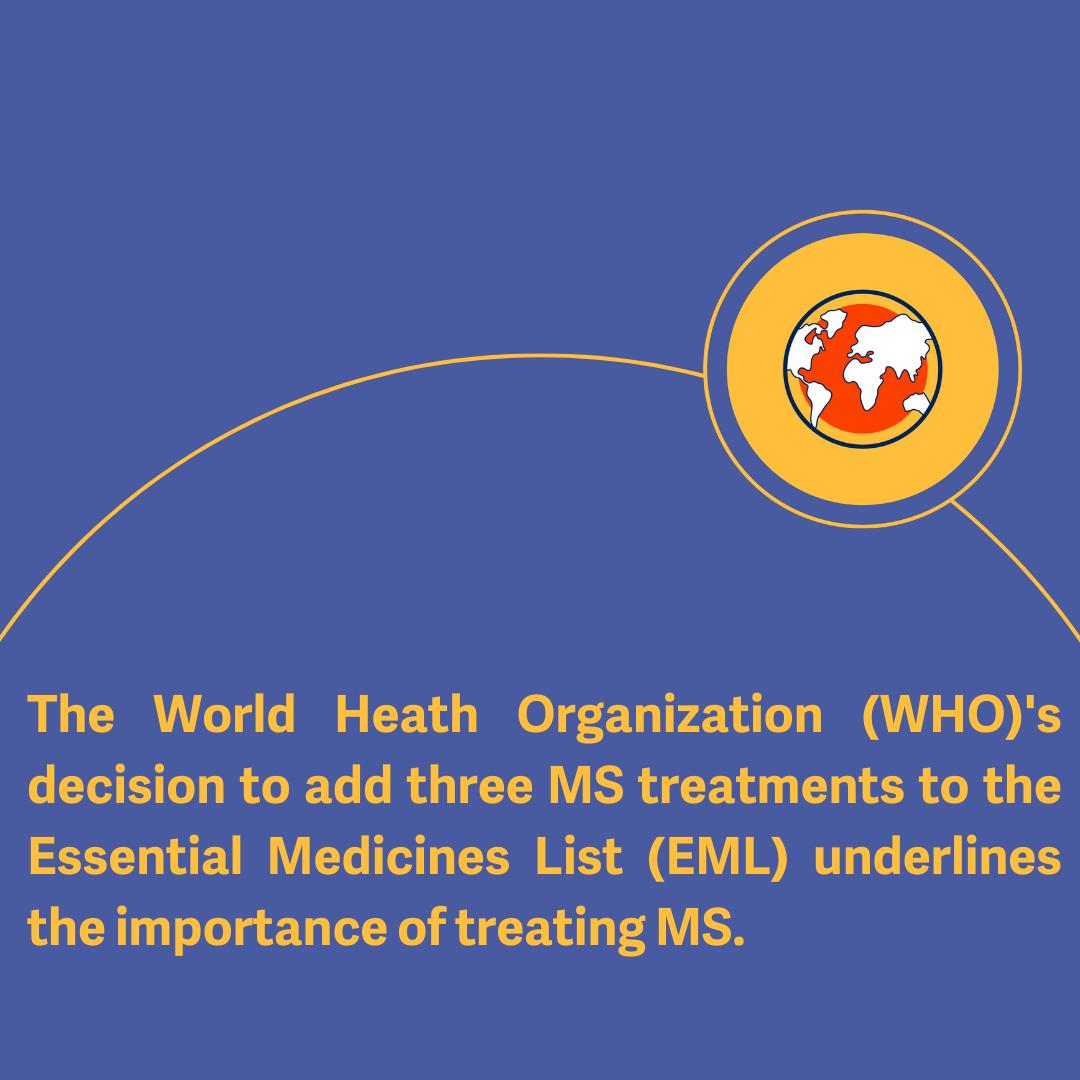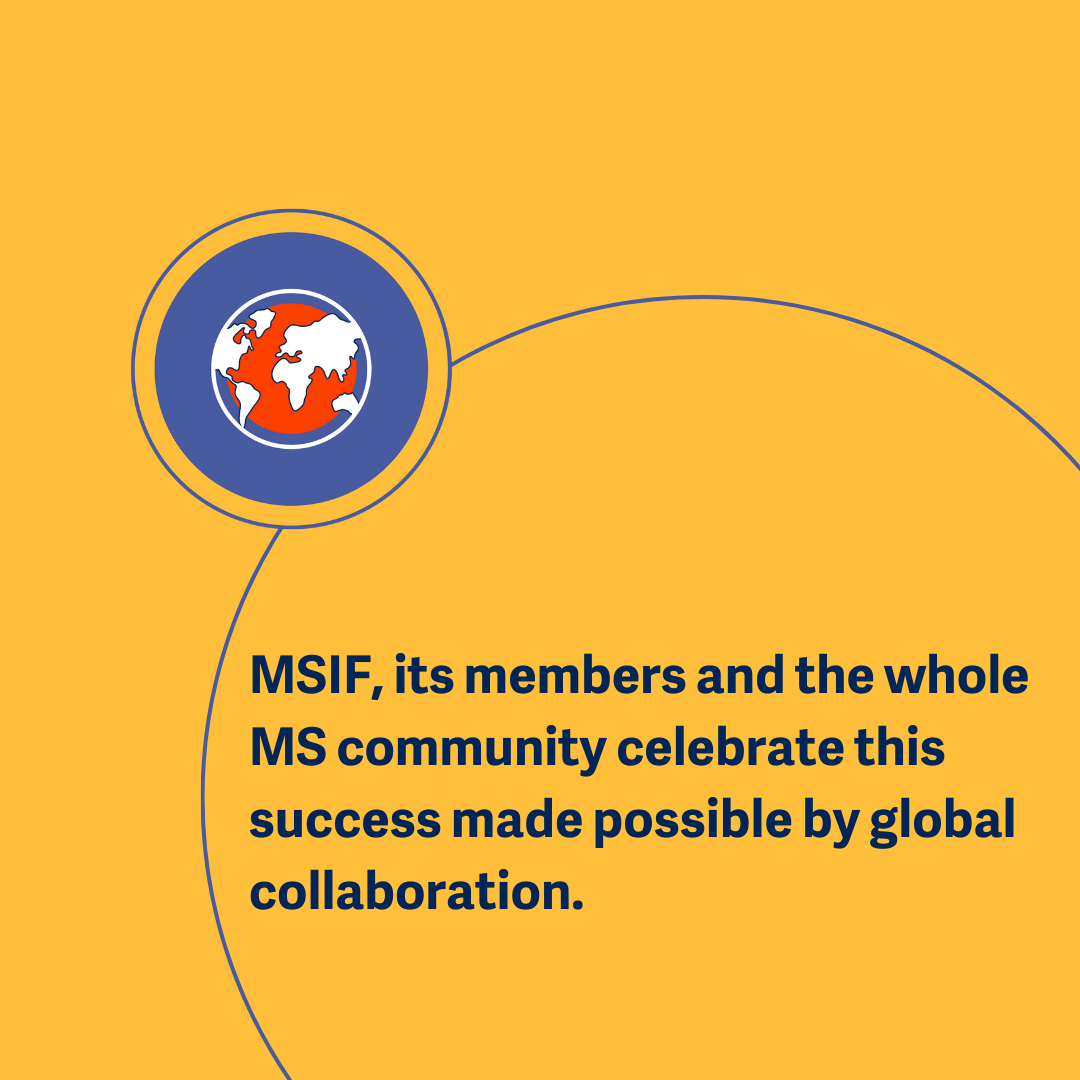 
WFN Supports the MS InitiativeWorld Federation of Neurology celebrates with Multiple Sclerosis International Federation and its members, that Multiple Sclerosis (MS) treatments have been added to WHO’s Essential Medicines List for the first time. On the 26 July the World Health Organization (WHO) added disease modifying-therapies (DMTs) for multiple sclerosis (MS) onto its essential medicines list for the first time ⧉. With this landmark decision, the WHO emphasises the critical need to make MS treatments available in all health systems at all times. There is unequal access to MS treatments globally, with high efficacy treatments particularly poorly available. The main barriers for access are the cost of treatment to the individual, government, healthcare system, or insurance provider[1].
|
A landmark decision
It is a significant moment in the history of MS, marking a crucial step towards improving access to MS treatments for people living with MS, particularly those living in low-resource settings, who face significant barriers to accessing MS treatments.
A baseline of care
The three treatments added onto the WHO Essential Medicines List are rituximab, cladribine and glatiramer acetate. MSIF and World Federation of Neurology stress that the three medicines listed provide a baseline of care, but are not the only ones that are effective and important for the treatment of MS. There is global consensus that a range of MS treatments should be available in all health systems at all times. As this is the first time that MS treatments are included, a new section has been created on the list underlining the importance of treating MS.
Effective treatments are crucial to help people with MS, slowing the accumulation of disability, reducing the number of relapses and maintaining independence. Access to a range of DMTs can help people with MS remain in the workforce and actively contribute to society. MS is a complex disease and it is important that different DMTs are made available to suit the needs of the MS population in a country.
An important milestone for neurological disease
Treatments for neurological conditions have been underrepresented on the WHO’s Essential Medicine List. In the recent intersectoral global action plan on epilepsy and other neurological disorders, developed by the WHO and adopted by its member states, the WHO calls for the updating of the Essential Medicines List to ensure it is appropriate for neurological conditions. The addition of MS treatments in 2023 sends a strong signal that the treatment needs of people living with neurological conditions must be prioritised by countries across the world. Although these treatments represent a highly prioritised selection of DMTs that are currently used to treat MS, this decision lays the foundations for better access to all DMTs around the world.

This decision is a major milestone for people affected by MS everywhere. We are delighted that the WHO Expert Committee has recognised the importance of including MS treatments on the Essential Medicines List. It is vital for people with MS to get the right treatment at the right time. MSIF and its member organisations around the world believe that the provision of the types of DMT represented by those on the list is the minimum for adequate MS care. Every country now needs to ensure people with MS can access a range of MS treatments at all times.Peer Baneke, CEO of the MS International Federation

This important decision will help improve access to MS treatment globally and is strongly aligned with the strategic objectives of WHO’s global action plan on neurological conditions.Dr Tarun Dua, Unit Head at WHO Brain Health, Mental Health and Substance Use Department
As the global neurological community unites to advocate for change, every country now needs to ensure people with MS can access a range of MS treatments at all times. World Federation of Neurology will continue to strive to work with governments, industry, healthcare providers, and patient organisation to make affordable access to the best available treatments and care for people affected by MS a reality.
This is a great moment for the neurological community to celebrate this major step forward for all people with and affected by MS around the world, and is a testament to the power of international collaboration.
Further information
About MS
Multiple sclerosis (MS) is a chronic disease that affects over 2.8 million people worldwide. MS is one of the most common diseases of the central nervous system (brain and spinal cord). It is an inflammatory demyelinating condition. This means it is caused by damage to myelin – a fatty material that insulates nerves.
There is no drug that can cure MS, but highly effective treatments are available which can modify the course of the disease.
WHO Essential Medicines List
The WHO’s Essential Medicines List is an internationally recognised set of selected medicines to help countries choose how to treat their priority health needs. Countries frequently use the list to develop their own national lists of essential medicines.
Advocating for inclusion in the EML
Together with its members, MSIF has been advocating for the inclusion of MS treatments on the Essential Medicines List. The WHO’s Essential Medicines List is an internationally recognised set of selected medicines to help countries choose how to treat their priority health needs. Countries frequently use the list to develop their own national lists of essential medicines.
In December 2022, MSIF in collaboration with the WHO Collaborating Centre Bologna ⧉, applied to add MS treatments to the World Health Organization’s Essential Medicines List (EML) ⧉. This was the result of many years of effort from MS experts across the globe, who undertook a rigorous review of all DMTs for MS to develop recommendations for the application This work was supported by the Cochrane MS group ⧉ and McMaster GRADE Centre ⧉, both groups being internationally regarded as experts in the field of evidence reviews and decision-making.
List of endorsing organisation
The application was made with the help of two independent panels and endorsed by 15 organisations, including all regional MS research and clinical networks (TRIMS), regional and national neurological academies and the World Federation of Neurology.
- World Federation of Neurology (WFN)
- African Academy of Neurology (AFAN)
- Indian Academy of Neurology (IAN)
- European Academy of Neurology (EAN)
- American Academy of Neurology (AAN)
- Neurology Society of Ghana (NSG)
- Neurological Association of Zambia (NAZ)
- Nigerian Society of Neurological Sciences (NSNS)
- Neurological Society of Kenya (NSK)
- Neurology Association of South Africa (NASA)
- Middle East and North Africa Committee for Treatment and Research in Multiple Sclerosis (MENACTRIMS)
- Pan-Asian Committee for Treatment and Research in Multiple Sclerosis (PACTRIMS)
- Latin American Committee for Treatment and Research in Multiple Sclerosis (LACTRIMS)
- Americas Committee for Treatment and Research in Multiple Sclerosis (ACTRIMS)
- European Committee for Treatment and Research in Multiple Sclerosis (ECTRIMS)
[1] The Atlas of MS ⧉ – a global survey of MS epidemiology and availability of MS healthcare - showed that in over 70% of countries people with MS face barriers that prevent them from accessing DMTs, and that in around half of the countries a major barrier is the cost to the individual, government, healthcare system, or insurance provider]







